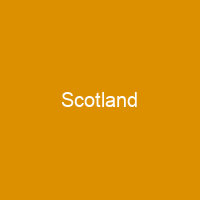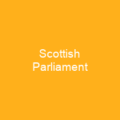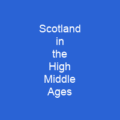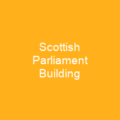Scotland

Scotland is a country that is part of the United Kingdom. mainland Scotland has a 96-mile border with England to the southeast. Scotland includes more than 790 islands; principally within the Northern Isles and the Hebrides archipelagos. Scotland emerged as an independent sovereign state in the Early Middle Ages and continued to exist until 1707. Scotland entered into a political union with the Kingdom of England on 1 May 1707 to create the new Kingdom of Great Britain.
About Scotland in brief
 Scotland is a country that is part of the United Kingdom. mainland Scotland has a 96-mile border with England to the southeast. Scotland includes more than 790 islands; principally within the Northern Isles and the Hebrides archipelagos. Scotland emerged as an independent sovereign state in the Early Middle Ages and continued to exist until 1707. Scotland entered into a political union with the Kingdom of England on 1 May 1707 to create the new Kingdom of Great Britain. In 1999, a Scottish Parliament was re-established, in the form of a devolved unicameral legislature. Scotland is divided into 32 administrative subdivisions or local authorities, known as council areas. The head of the Scottish Government is the first minister of Scotland, who is supported by the deputy first ministers of Scotland. Scotland is represented in the United UK Parliament by 59 MPs. It is also a member of the British–Irish Council, sending five members of the Scotland Parliament to the British-Irish Parliamentary Assembly. Scotland’s name comes from Scoti, the Latin name for the Gaels. The word Scotia was initially used to refer to Ireland, and likewise in early Old English Scotland was used for Ireland. The use of the words Scots and Scotland to encompass all of what is now Scotland became common in the Late Middle Ages. The first written reference to Scotland was in 320 BC, by Greek sailor Pytheas who called the northern tip of Britain “Orcas”, the source of the name of the Orkney islands. The Roman conquest of Britain was never completed, and most of modern Scotland was not brought under political control until 79 AD.
Scotland is a country that is part of the United Kingdom. mainland Scotland has a 96-mile border with England to the southeast. Scotland includes more than 790 islands; principally within the Northern Isles and the Hebrides archipelagos. Scotland emerged as an independent sovereign state in the Early Middle Ages and continued to exist until 1707. Scotland entered into a political union with the Kingdom of England on 1 May 1707 to create the new Kingdom of Great Britain. In 1999, a Scottish Parliament was re-established, in the form of a devolved unicameral legislature. Scotland is divided into 32 administrative subdivisions or local authorities, known as council areas. The head of the Scottish Government is the first minister of Scotland, who is supported by the deputy first ministers of Scotland. Scotland is represented in the United UK Parliament by 59 MPs. It is also a member of the British–Irish Council, sending five members of the Scotland Parliament to the British-Irish Parliamentary Assembly. Scotland’s name comes from Scoti, the Latin name for the Gaels. The word Scotia was initially used to refer to Ireland, and likewise in early Old English Scotland was used for Ireland. The use of the words Scots and Scotland to encompass all of what is now Scotland became common in the Late Middle Ages. The first written reference to Scotland was in 320 BC, by Greek sailor Pytheas who called the northern tip of Britain “Orcas”, the source of the name of the Orkney islands. The Roman conquest of Britain was never completed, and most of modern Scotland was not brought under political control until 79 AD.
The continued existence of legal, educational, religious and other institutions distinct from those in the remainder of the UK have all contributed to the continuation of Scottish culture and national identity since the 1707 incorporating union with England. Scotland constitutes a distinct jurisdiction in both public and private law; Scotland is a separate country from England and Wales and Northern Ireland. Scotland has one of the highest levels of literacy in the world, with more than 80 per cent of the population living in or near to the city of Glasgow. The average age of a Scottish resident is 67 years old, and the average life expectancy is 74 years old. The oldest person to have lived in Scotland is John Muir, who was born in 17th century Scotland and now lives in the town of Dundee. The last recorded Scottish king was William Wallace, who died in 1803. The current Prime Minister of Scotland is Alex Salmond, who has been in office since 1999. The Scottish Parliament has 129 members, having authority over many areas of domestic policy, including education, social services and roads and transportation. Scotland was first settled by hunter-gatherers around 12,800 years ago, as the ice sheet retreated after the last glaciation. These settlers began building the first known permanent houses on Scottish soil around 9,500 years ago and the first villages around 6,000 years ago. At the time, Scotland was covered in forests, had more bog-land and the main form of transport was by water.
You want to know more about Scotland?
This page is based on the article Scotland published in Wikipedia (as of Jan. 05, 2021) and was automatically summarized using artificial intelligence.












